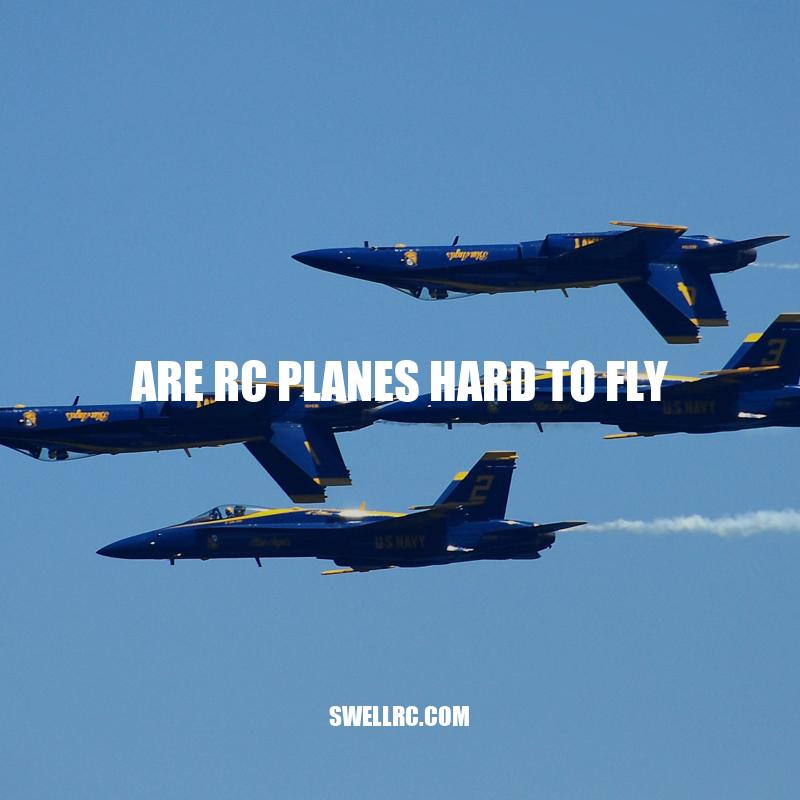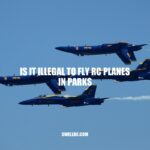Mastering RC Plane Flying: Tips and Techniques for Beginners and Advanced Pilots
RC planes, or radio-controlled planes, have been a popular hobby among aviation enthusiasts for several decades. The technology behind RC planes has advanced significantly over the years, making it easier for people to enjoy flying them. However, many people still have concerns about the difficulty of flying RC planes, particularly for beginners. The question remains, are RC planes hard to fly? The answer to this question isn’t a simple one, as there are many factors that can affect the flying difficulty of an RC plane. In this article, we’ll explore these factors in detail, while also offering tips and insights on how you can effectively learn to fly an RC plane. Whether you’re new to RC planes, an experienced flyer, or simply curious about what it takes to fly these miniature planes, this article will provide valuable insights to help you on your journey.
Factors that Affect RC Planes Flying Difficulty
There are many factors that can affect the flying difficulty of an RC plane, including:
- Size and Weight: Larger RC planes are generally more difficult to fly than smaller ones. Similarly, heavier planes require more skill and experience to fly effectively.
- Power Source: Electric RC planes are generally easier to fly than gas-powered planes, as they’re quieter and require less maintenance. Gas-powered planes offer more power and speed, but require more skill to fly them effectively.
- Wind and Weather: Wind and weather conditions can greatly affect an RC plane’s stability and maneuverability. Stormy, windy or rainy conditions can make it more difficult to fly the plane.
If you’re new to RC planes, it’s important to keep these factors in mind when choosing the right plane for your skill level. Additionally, regular practice and taking the time to learn more advanced flying techniques can help improve your abilities as a flyer. There are various websites and forums that offer resources and support to help new RC plane flyers to succeed, such as RC Universe, Flite Test, and RC Groups. Moreover, purchasing a beginner-friendly RC plane can facilitate a smooth learning process such as E-flite Apprentice STS 1.5m RTF.
Are bigger RC planes easier to fly?
Not necessarily. Bigger RC planes may be more stable in the air, but they also require more space to fly and can be more difficult to transport.
Factors that determine ease of flying include:
- Design and construction quality
- Wing size and shape
- Power and propulsion system
- Pilot skill and experience
Before purchasing an RC plane, consider your level of skill and experience, the space available for flying, and the features of the plane.
If you’re interested in purchasing an RC plane or learning more about flying, check out websites such as Horizon Hobby or RC Planet for a wide selection of products and resources.
Beginner RC planes
For beginners, it’s important to have a beginner-friendly RC plane that is easy to fly and has stable flight characteristics. Here are some of the best options for beginner RC planes:
| Name | Wingspan | Power Type | Price |
|---|---|---|---|
| E-flite Apprentice S 15e RTF | 59.0 in (1500mm) | Electric | $299.99 |
| HobbyZone Sport Cub S RTF | 24.3 in (616mm) | Electric | $129.99 |
| Volantex TrainStar Ascent Beginner RC Airplane | 48 in (1220mm) | Electric | $129.99 |
Facts:
- E-flite Apprentice S 15e RTF offers SAFE technology which is specifically designed for newer pilots, providing them help in maintaining control even if they lose orientation.
- HobbyZone Sport Cub S RTF puts an emphasis on safety as it features durable construction and steerable tail-wheel making it easier to land and take-off.
- Volantex TrainStar Ascent Beginner RC Airplane offers 3 channels of control facilitating a more stable and easier flying experience.
Many of these planes come with everything you need to get started, including a remote control, charger and sometimes even extra batteries for the plane itself. Additionally, it is recommended that beginners practice in open spaces, staying away from power lines, trees, and other obstacles that might interfere with the flight. An essential site for recommended beginner-friendly planes is Flite Test which offers many reviews, ratings and fit-for-purpose planes for beginners.
What is a good first RC plane?
If you’re just starting with remote-controlled planes and want to know which one to buy, here are a few good options:
- HobbyZone Sport Cub S RC Airplane
- VolantexRC TrainStar Epoch Brushless RC Airplane
- Top Race RC Plane 3 Channel
All these planes are excellent for beginners, offering stability and durability while remaining easy to fly and control in the air. Make sure you do your research before buying, and consider reading reviews on sites like Amazon or RCPlanet to help you make a decision.
Remember, practice makes perfect, so keep practicing and have fun!
Tips for flying RC planes
Here are some helpful tips for beginners to make their experience of flying a RC plane more enjoyable and stress-free.
Read the manual:
RC planes come with a manual and it’s important to read it before flying. The manual is tailored to the specific RC plane and can provide detailed instructions for operation and maintenance. Here are a few things to consider while reading the manual:
- Battery life and replacement
- Remote control range and operations
- How to fix common problems and errors
Pack the essentials:
Make sure you have everything you need before taking off.
- Extra batteries for the plane and remote control
- First aid kit / basic medicine for insect bites or stings
- Sunscreen and hat as flying outdoors for a long time may cause sunburns or heat exhaustion
Avoid wind and rain:
Weather conditions are important to consider when flying an RC plane. Here are some tips to keep in mind when checking weather conditions:
- Look out for wind speeds of around 5-10 mph, as speeds beyond that could make flying the plane difficult
- Avoid flying in wet or damp weather, as this can damage electronic components of the RC plane
Websites such as Flite Test and RC Groups run forums that provides tips, advice and recommendations for troubleshooting with experienced RC plane pilots. These sites also offer tutorials, articles, product reviews and buyer guides. Through these forums, beginners can connect with other enthusiasts who share the same interests, exchange ideas and learn more about the ins and outs of flying RC planes.
Is There a Manual Airplane?
No, there is no such thing as a fully manual airplane. All planes rely on complex technology and systems to operate, including engines, hydraulic systems, avionics, and flight controls. However, pilots are trained to be able to operate the plane manually in case of emergency or system failure. In fact, most modern airplanes have automated systems that can assist the pilot with flying the plane, but they still require a trained human to operate them.
If you want to learn more about how airplanes work, you can visit websites like FlightAware or Boeing, which offer detailed information on aircraft technology and operations.
Advanced flying techniques
Once you have mastered the basics of flying an RC plane, you may want to attempt advanced flying techniques. Here are a few techniques to try:
Aerobatics:
These are stunts and maneuvers that involve rolling, flipping, and inverted flying. Aerobatics require faster planes that are maneuverable and have a better response to controls.
Precision flying:
This technique involves flying an RC plane in a specific pattern, such as a figure-eight or a straight-line. Precision flying requires accuracy and full control of the plane with minimal error.
First Person View (FPV):
This technique allows the pilot to fly the plane as if they were sitting in it. FPV involves attaching a camera to the front of the plane and a video transmitter which streams the video to a pair of FPV goggles or a monitor.
Advanced pilots may want to invest in more specialized planes that can handle these maneuvers such as the E-Flite UMX Aero Commander BNF, the E-flite mini-convergence VTOL or the FMS Ranger 850mm. It’s important to research and read reviews before purchasing a more advanced and expensive RC plane.
Websites such as RC Universe and RC Groups have forums dedicated to advanced flying techniques, where experienced pilots talk about tips, tricks, and aerobatic or precision competition events. These sites also provide tutorials, educational videos, and articles for passionate pilots that want to push their limits to the next level.
What are the basic flying techniques?
Here are some of the essential flying techniques that every beginner pilot should know:
- Takeoff and Landing: Properly and safely taking off and landing a plane is an essential skill for any pilot. It requires good judgment, control, and coordination.
- Maneuvering: Knowing how to move the plane in different directions – such as turning, climbing and descending- is critical for safe and effective flight.
- Navigation: Pilots should know how to use tools such as maps and GPS to navigate their flight paths.
- Communication: Effective communication between the pilot and air traffic control is necessary for safe flight.
- Emergency aviation: Knowing how to handle emergency situations such as engine failure or turbulence in the air is key for a pilot.
Whether you are learning to fly for pleasure or preparing for your pilot’s license, it is important to know the basics of flying. For more information, visit trusted aviation resources such as the Federal Aviation Administration’s website.
Conclusion
Flying RC planes can be a fun and rewarding hobby, but it does require patience, practice, and dedication. The difficulty of flying RC planes varies depending on the type and size of the airplane, the skill set of the pilot, and environmental influences such as weather conditions. However, with the right knowledge, a beginner can learn to fly an RC plane in a relatively short period.
Some tips for beginners include starting with a trainer plane, investing in a simulator, and taking lessons from an experienced pilot. Experienced pilots might want to challenge themselves by attempting aerobatics, precision flying, and First-Person-View flying. Investing in a specialized plane for these techniques may be necessary.
In conclusion, RC plane flying can be a fun hobby for people of all ages. While it does require practice and knowledge, it doesn’t have to be hard to learn. With a bit of time and patience, anyone can enjoy the thrill of flying an RC plane. Don’t forget to research and understand the risks and safety precautions before flying an RC plane. Stay safe and have fun!



